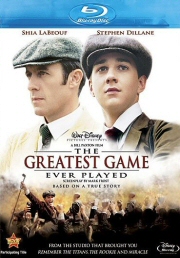Ever Played
- Rated PG
- Drama
- 2005
- Buy the Blu-ray
All photos © Walt Disney
Reviewed by David Medsker
()
isney’s had a good thing going for the last few years with these sports movies based on true stories. They are tales where the ending can be seen down Broadway and around the corner, but the notion that David can beat Goliath, that the sum is far, far greater than the parts, has massive appeal. Dennis Quaid striking out Royce Clayton (“The Rookie”), the US Olympic hockey team of scrubs beating the mighty Russians (“Miracle”), Denzel Washington uniting a school and town for a good far greater than football (“Remember the Titans”); who can resist this stuff?
Up to this point, no one, but that is about to change. “The Greatest Game Ever Played,” based on Mark Frost’s novel, is amusing, touching, and all of those things that made those other movies so successful. Something is off, though: Bill Paxton’s direction is too gimmicky for a period piece, and the class similarities between both hero and villain are handled with a leaden touch. It’s also a touch on the long side.
The movie begins in the Isle of Jersey, England, with a young Harry Vardon (played as an adult by Stephen Dillane) waking up to find four gentlemen (and that term is used loosely) planning out a golf course on the land upon which his family’s house resides. Cut to 21 years later, where Vardon is now regarded as the greatest golfer in the world, and a young caddy named Francis Ouimet (Shia LaBeouf) skips school, with the help of his mother, to meet Vardon. Vardon gives young Francis a tip on holding the club, and in the process creates a prodigy. But as golf was a game of class and status at the time, lots of people were quick to remind Francis of his place in the world, including his deeply bitter father (Elias Koteas).
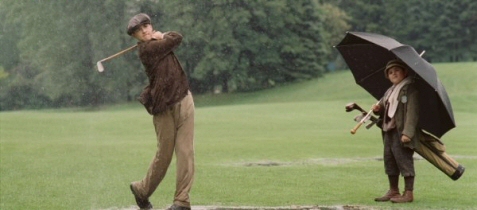
Luckily for Francis, there are a lot of people at the Brookline club where he caddies that are eager to help him. He enters a tournament, but needs fifty dollars, a king’s ransom at the time, for the entry fee. His father gives him the money, but makes him swear to quit the game for good if he doesn’t make the cut. Of course, he misses the cut by one stroke, and true to his word, he puts his clubs away for a retail job. His benefactors contact him a few years later (1913), when the US Open comes to Brookline, and ask him to consider entering as an amateur. After turning them down at first, he reconsiders, and busts his tail getting ready. The guy he lines up to caddy backs out, and he picks a blustery ten year-old named Eddie Lowery (Josh Flitter) to hold his clubs, which are taller than he is.
I have not read Frost’s book, so I am unsure if the cliché aspects of the story – the rich girl love interest (Peyton List) that he can never have, the persistent snobbery and contempt of the upper class, Ouimet and Vardon matching each other shot for shot until the very last hole – are the events as they actually happened or if they were massaged slightly for the sake of drama. If that is how things indeed went down, then it’s actually too bad, because it feels more like Hollywood magic than the truth. The look of the era, from outfits to hairstyles to the gear the players used and the courses they played, looks authentic, but Paxton’s effects-heavy photography definitely reels the viewer back into the here and now, to its detriment. Any golfer knows how nerve wracking the game can be, and Paxton goes to great, great lengths to show the ghosts that haunt both players and the efforts they make to ignore them. Unfortunately, that seemingly requires panoramic shots of the gallery, trees and obstacles blowing away like little dust fairies. It all feels excessive, given the time period of the subject matter.
But hats off to Shia LaBeouf, the star of a great little movie called “Holes” from a couple years ago, who is immensely likable as Francis. Koteas doesn’t fare so well as his beyond-stubborn father, who looks like the older brother of Daniel Day-Lewis’ Billy the Butcher in “Gangs of New York.” Flitter steals the movie as Eddie, but while his lines are funny, his vernacular is far too modern. Stephen Marcus, though, is a hoot as Vardon’s working class golfer buddy Ted Ray, who’s not blessed with finesse but can hit the ball a country mile. Don’t blink or you’ll miss a cameo from Joe Jackson playing piano in the rowdy bar scene where Ted is introduced.
It seems mean to pick on a movie like “The Greatest Game Ever Played,” since it’s the prototypical sports movie nearly a century before such a thing existed. However, thirty years into the modern era of sports movies, a newcomer has to be a lot of things to be considered truly great, even if the event it covers actually happened almost a hundred years ago and the story is a thrilling one. Sadly, in movies, as in life, the first one to the finish line wins, and to the victors go the spoils.
Single-Disc Blu-Ray Review:
Though Disney has been doing a better job lately with their Blu-ray releases, the single-disc reissue of "The Greatest Game Ever Played" is nothing more than a copy of the DVD edition. With only two featurettes to choose from ("A View From the Gallery" and "Two Legends and the Greatest Game") and an old interview reel featuring Francis Ouimet, fans of the film will have to rely on the disc's two audio commentaries (the first with director Bill Paxton and the other with writer Mark Frost) to get their money's worth.
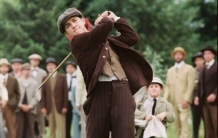 |
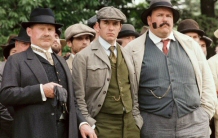 |
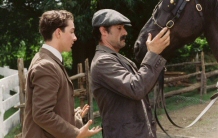 |
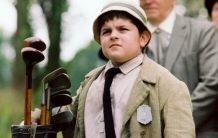 |
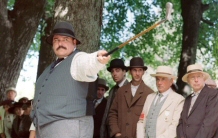 |
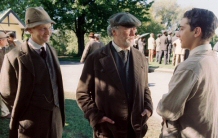 |
You can follow us on Twitter and Facebook for content updates. Also, sign up for our email list for weekly updates and check us out on Google+ as well.












